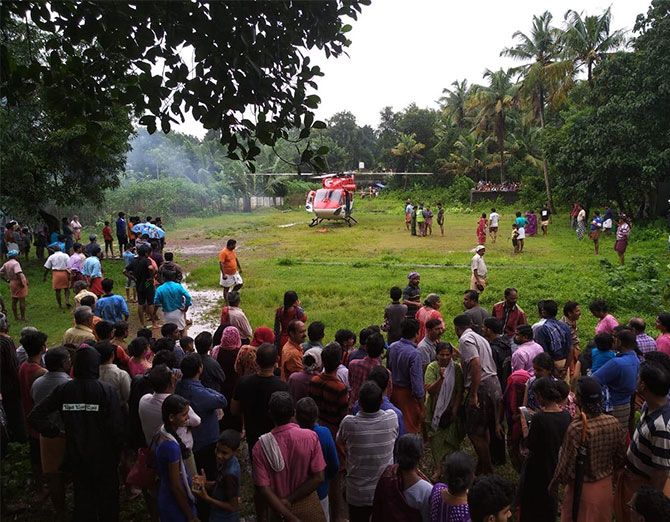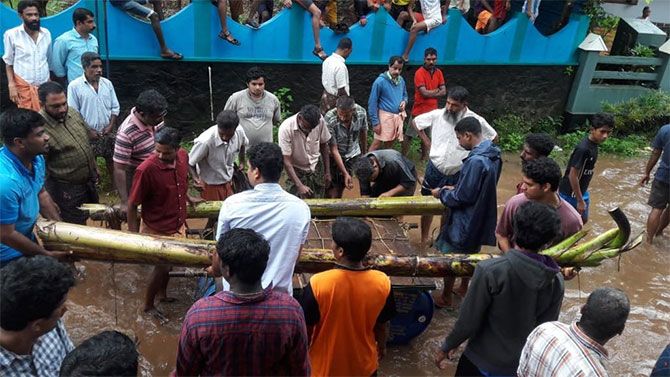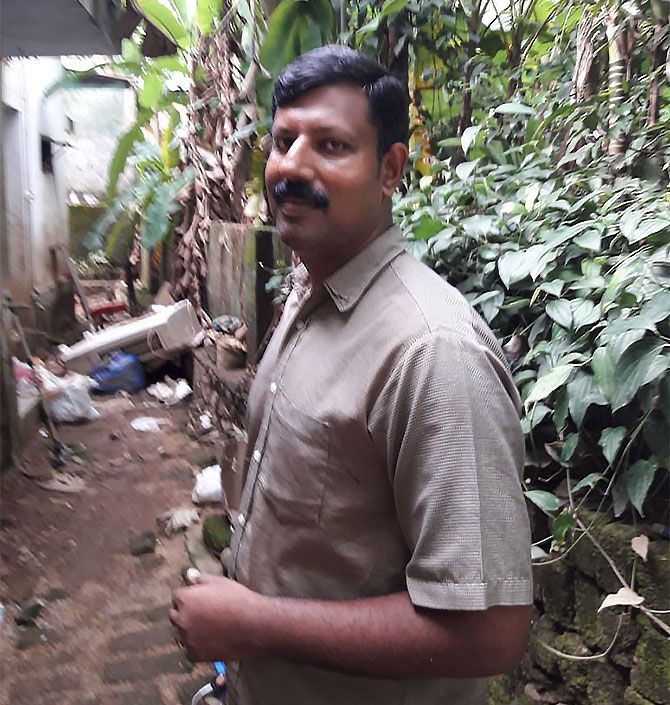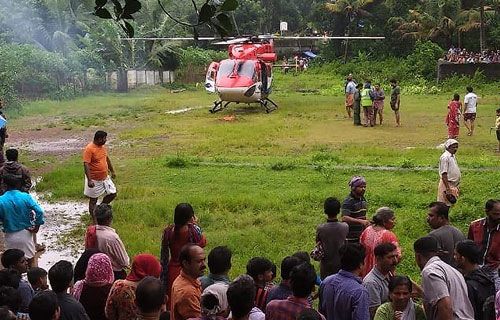Basil George led an amazing rescue mission making it possible for a helicopter to land and rescue people in the Kerala floods.
In an admirable community effort, he and his team swam through strong currents, broken walls and floating snakes to help friends and strangers.
Rediff.com's Archana Masih on how a single man inspired a community on a most difficult day.

A retired assistant air traffic controller from the Indian Air Force, Basil George's training in the IAF came handy in the greatest hour of need.
When waters were head high near his home in Neduvannur, Kerala, he led a team of local volunteers to set up a helipad near a temple to rescue those who needed urgent medical attention.
People were stranded on rooftops for three days. George, who served in the IAF for 18 years, identified a flat surface on a higher ground and along with locals, prepared the helipad in two-and-a-half hours.
"The only obstruction was a coconut tree which was cut within minutes. Somebody managed to find chuna (lime) to make white markings. I knew what the landing requirements were -- so we cleared the approach path by removing cattle and vegetation," says George, who was deployed at the Kargil helipad for 46 days during the Kargil War, and now works in the Kerala State Industrial Enterprises as a fire-cum-safety officer.
With one of his phones washed away and the other dead, he was able to establish contact with rescue workers after someone offered an inverter to charge his mobile battery.
In the early hours of August 18, through the help of Jania Mathew who was helping in coordinating rescue work, he was able to contact a doctor in the rescue mission. The doctor, in turn, connected him to a colonel in the Indian Army who assured him that an air force pilot on a rescue sortie would contact him.
"I told the pilots the exact location of the helipad and what arrangements we had done. Finally Squadron Leader Sneha Kulkarni and Flight Lieutenant Deepak were able to make a landing and rescue 7 people," recalls George.
WATCH: Squadron Leader Sneha Kulkarni lands the helicopter on the helipad. She and Flight Lieutenant Deepak made another sortie to deliver food and medicines. Video: Kind courtesy, Rahulraj
"The locals were very ingenuous. They even sent smoke signals and had cleared the area in a way that enabled us to make a safe landing," remembers Squadron Leader Sneha Kulkarni, whose unit based in Sulur, Coimbatore, deployed 16 pilots, 6 engineers and 30 ground crew.
The pilots made another sortie later in the afternoon to deliver medicines and food.
One of the rescued was a patient needing dialysis; another, a pregnant lady. The lady delivered a healthy baby.
"Seeing the helicopter gave confidence to the people. It was God's plan and I was only a tool," says George over the phone, where he is busy cleaning his home and the surrounding area, simultaneously assessing the loss and damage.
"Material loss can be recovered but life is priority -- we swam through the flood waters without injury and snake bites which is a blessing."
"Together, we, the people, did it," emphasises George
Uncomfortable about taking credit himself, George repeatedly asserts it was a community effort.
"We need to train youngsters about disaster management -- about flood rescue, setting up camps, maintaining hygiene etc. It is an important factor in national building," he adds.

Two days before setting up the helipad, Basil George and his family had spent the night of August 15 on the terrace of their home. They were evacuated by locals to a camp near the temple.
At the camp there was talk of 75 people stranded in a mosque for two days. Two floors of the mosque were under water.
George took charge and asked for volunteers. Twenty five men came forward and he led them into the rescue effort.
A bamboo raft was made to carry water and food.
Ropes were tied between poles and trees to provide support in the strong current as they made their way to the mosque.
They had to be careful not to get sucked into submerged wells.
They had to avoid collapsed walls, glass chards, thorny bushes and snakes.
When a lorry laden with bananas was discovered, some dove in to bring out the fruit which was put on the raft and distributed to stranded people.
While swimming through a tapioca patch, they pulled out the roots and carried it to the mosque.
En route, they distributed water and food to people.
The group also bound floating branches together into a small raft and left drinking water on it for those in need.

"We started swimming towards the mosque at 8.30 and reached at 2. Out of the 25, only 9 of us could make it. It was too difficult for the rest in the dangerous and raging water," says George.
An old woman was rescued in a large cooking vessel used for preparing biryani.
It was evening by the time they made their way back to the camp. "I had swum through the day. On reaching back, I discovered my body all over was bitten by insects," he says.
Seven years after he left the air force after serving the country in places as diverse as Agra, Leh, Kashmir including an overseas posting in Bhutan, Basil George led the way in serving his community during its worst natural crisis.
But he thinks of himself as no hero.
"As citizens of this country, everyone is serving the country," he says. "There is no age, community, caste, region, religion. We all came together for each other."










